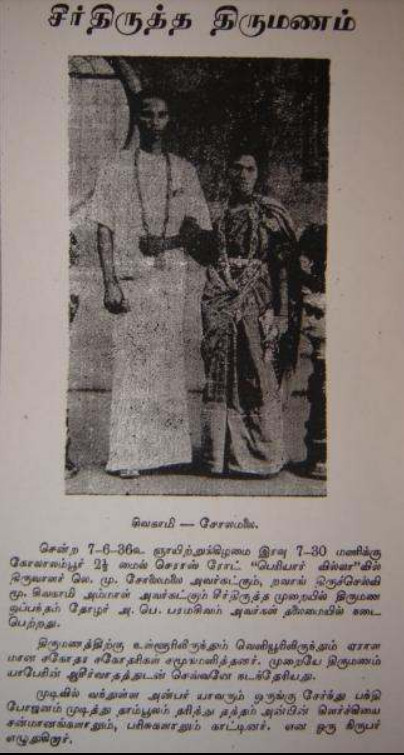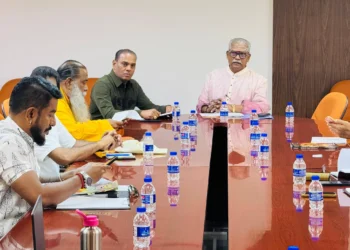Marriage is a union between two equal partners who express mutual respect, admiration, and ideological solidarity with one another. The companionship that the union of marriage presents demands that the two individuals be committed to the growth and liberation of one another, but too many people often express neglect, isolation, and even abuse within their marital relationship. Within the context of the Tamil people, marriage since the rise of feudalism has been about the maintenance of caste endogamy and economic power. Through the continuous struggles of numerous movements like the Workers Movement and the Dravidian Movement, Tamil society has gradually progressed in modern times to establish a society that is somewhat more tolerant of inter-caste and inter-faith marriages.
These marriages became symbols of rebellion against the oppressive patriarchal caste system; they came to be known as self-Respect Marriages. For the first time in centuries, women and men in Tamil society had the freedom to choose who they wanted to share their lives with. Even with these reforms that have absolved some of the shackles of backward societal hierarchies, Tamil women are increasingly choosing to marry later in life due to the overwhelming fact that it is becoming more difficult to find an appropriate life partner.

According to the study conducted by the Malaysian Statistics Department, in 2010, the percentage of unmarried women between the ages of 25 and 29 was only 37.8%, but today that number has nearly doubled. The University of Malaya, along with the National Population and Family Development Board, jointly conducted an in-depth study on this matter. According to their study, in the 1970s, women married at the average age of 22, that average age increased in the 2000s to 25–26, and at this stage, there are increasingly unmarried women even over the age of 30. In their conclusion, they found that women had several reasons for delaying marriage. 18% stated that they would rather prioritise their career; 26% stated that they had financial issues that they needed to take responsibility for; but an overwhelming percentage of 35.7% of women expressed that they could not find a suitable partner. Bernama had posted on their Instagram handle asking Tamil women if it were true that they delay their marriages because of the difficulties faced in finding a suitable partner, and 79% of the poll agreed with the statement. Women have also expressed some other reasons for delaying marriage, such as their particular family situations, the option of living with their partners without marriage, and some just plainly stating they are not interested in marriage and want to maintain their freedom.

Psychologist Gunapathy Arumugan stated that women are often afraid of the institution of marriage because of the oppressions they may face through it. He states that women enter marriages with fear, doubt, and a sense of helplessness. Women in this society grow up watching the failures and often violent situations that bad marriages can lead to. They routinely witness divorces, family disputes, and the struggles married women face at the hands of their husbands; all these things lead women to delay their own marriages out of fear. For those who grew up in households where their parents constantly fought and abuse was common, the hope for a happy marriage of their own is very slim.
Gunapathy further informs us that society has progressed to see an increasing number of women enter the workforce. Today, every household has a working woman equally contributing to the family. This increased status in society has given women the right to choose when and to whom they get married. Some women who are focused on developing their careers and gaining private wealth of their own often neglect the prospect of marriage until they have reached a later stage in life. Either way, marriage is an incredibly political and personal union between two people. Both men and women need to independently choose their life partners with proper care and deliberation. It is through the continuous building of trust, friendship, and respect, that the beautiful and necessary institution of marriage can serve its purpose of companionship.

Source: Bernama, Critical Asia Archives
Follow us on Instagram, Facebook or Telegram for more updates and breaking news.








